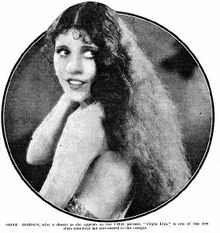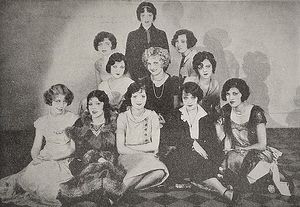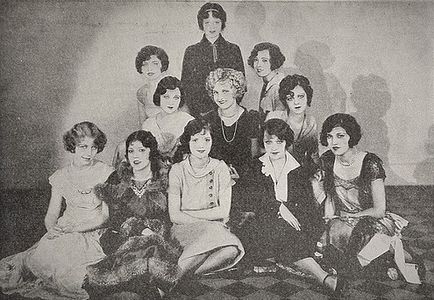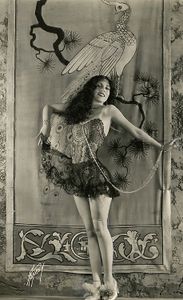Olive Borden: Difference between revisions
(Created page with "{{Header| 09/23}}{{DEFAULTSORT:}} == Olive Borden == <gallery mode="packed" heights="200px" caption=""> File: Olive Borden.jpg|from London Life magazine File:Olive_Borden-Ziegfeld.jpg|Publicity still </gallery> {{pixonly|January, 2024}} {{Ziegfeld}} ==Awards == === Hollywood Walk of Fame === === Lofa-b === === WAMPAS === {{Footer}} == External links == {{cat|}}") |
No edit summary |
||
| Line 1: | Line 1: | ||
{{Header| 09/23}}{{DEFAULTSORT:}} | {{Header| 09/23}}{{DEFAULTSORT:}} | ||
== Olive Borden == | {{Infobox person | ||
| color = mistyrose | |||
| name = Olive Borden | |||
| image = Olive Borden.jpg | |||
| imagesize = | |||
| caption = Borden in 1929 | |||
| birthname = | |||
| birthdate = {{dob|1906|07|14|mf=y}} | |||
| birthplace = Richmond, Virginia, U.S. | |||
| deathdate = {{dod|1947|10|01|1906|07|14}} | |||
| deathplace = Los Angeles, California, U.S. | |||
| deathcause = Stomach ailment / pneumonia | |||
| buried = Forest Lawn Memorial Park (Glendale) | |||
| othername = The Joy Girl | |||
| occupation = Actress | |||
| years_active = 1924–1934 | |||
| spouse = {{plainlist| | |||
* {{marriage|Theodore Spector|1931|1932|end=annulled}} | |||
* {{marriage|John Moeller|1934|1941|end=divorced}} | |||
}} | |||
| relatives = Natalie Joyce (cousin) | |||
}} | |||
Olive Mary Borden (July 14, 1906 – October 1, 1947) was an American film and stage actress who began her career during the silent film era. She was nicknamed "the Joy Girl", after playing the lead in the 1927 film of that same title. Borden was known for her jet-black hair and stunning overall beauty. | |||
At the peak of her career in the mid-1920s, Borden was earning $1,500 a week. In 1927, she walked out on her contract with Fox after refusing to take a pay cut. By 1929, her career began to wane due to her rumored reputation for being temperamental and her difficulty transitioning to sound films. She made her last film, ''Chloe, Love Is Calling You'', in 1934 and moved on to stage work for a time. By the late 1930s, she had declared bankruptcy and stopped acting. During World War II, she joined the Women's Army Corps. She was later honorably discharged with distinction after sustaining a foot injury during service. Borden attempted a comeback in films, however, she was hindered by her alcoholism and health problems. | |||
In 1945, she began working at the Sunshine Mission, a home for impoverished women located in the skidrow section of Los Angeles. She died there in October 1947 of a stomach ailment and pneumonia at the age of 41. | |||
== Career == | |||
[[File:Baby_Stars_1925_picture.jpg|thumb|1925 WAMPAS: Borden, seated, second from left|alt=Eleven nicely dressed young women that were chosen as the Western American Motion Picture Association Stars of 1925 are seated in a pyramid formation from the floor up]] | |||
Borden began her career as one of the [[Mack Sennett|Mack Sennett Bathing Beauties]] in 1922 and was soon appearing as a vamp in Hal Roach comedy shorts. Producer Paul Bern chose her for an uncredited role in his film The Dressmaker from Paris (1925). She was signed by Fox after being named a WAMPAS Baby Star in 1925 (along with her cousin, Natalie Joyce). Borden quickly became one of their most popular and highest paid stars earning a salary of $1,500 a week. She had starring roles in eleven films at Fox, including ''3 Bad Men'' and ''Fig Leaves'', both of which co-starred her then-boyfriend George O'Brien. ''3 Bad Men'' has also been featured at the Museum of Modern Art. During this time she worked with some directors who would go on to achieve major fame, including [[John Ford,]] [[Howard Hawks]], and Leo McCarey. | |||
Paramount Studios began a policy of 10% paycuts on any salary over $50 to recoup production costs, when Fox tried the same and cut her salary in 1927, Borden left the studio. By this point she was a major silent film star. In making the transition to "talkies" she worked with a voice coach (to suppress her Southern accent). She was less successful, but still remained in demand as an actress, continuing to work for Columbia and RKO. She had cut her trademark hair into a short bob, and turned herself into a modern flapper. But Borden had trouble with the new look, losing her identity; she couldn't find her audience and this confused her waning public. | |||
She made few movies in the early 1930s and her once promising career stalled, producing but one picture in 1932 (''The Divorce Racket''), and three in 1933 (''Leave it to Me'', Hotel Variety, and The Mild West). Her last screen credit came in the 1934 film Chloe, Love Is Calling You, where she played a woman kidnapped at birth and raised as a child of mixed race. Some say that this once-lost film "is so bad it should've stayed lost." A pre-code movie made under Will Hays, it had little box office success and in some states (mostly southern) it was banned at the time of its release. Borden then moved to New York, where she had a brief stage career, and made a living on the waning vaudeville circuit. | |||
== Early life == | |||
Borden was born in Richmond, Virginia on July 14, 1906. It was often erroneously reported that Sybil Tinkle was Borden's real name until the 1990s, when it was discovered that another woman had been confused with Borden. In a 1910 census report, her name is listed as Borden. Her father Harry Robinson Borden (1880–1907) died when she was a baby and she was raised by her mother Cecelia "Sibbie" Shields (1884–1959) in Norfolk, Virginia, and Baltimore, Maryland, where she attended Catholic boarding schools. Through her father, she was a fourth cousin of Lizzie Borden. | |||
<gallery mode="packed" heights="200px" caption=""> | <gallery mode="packed" heights="200px" caption=""> | ||
file:Baby_Stars_1925_picture.jpg|1925 WAMPAS: Borden, seated, second from left | |||
File:Olive_Borden-Ziegfeld.jpg|Publicity still | File:Olive_Borden-Ziegfeld.jpg|Publicity still | ||
</gallery> | </gallery> | ||
Borden was a dancer in the [[Ziegfeld Follies]] | |||
==Awards == | ==Awards == | ||
* [[Hollywood Walk of Fame]] | |||
* [[Lofa-b|Notable female movie actresses]] | |||
* [[WAMPAS|WAMPAS Baby Stars ]] | |||
{{Footer}} | {{Footer}} | ||
== External links == | == External links == | ||
{{cat|}} | {{cat|Ziegfeld Follies}} | ||
Revision as of 02:42, 28 January 2024
Olive Mary Borden (July 14, 1906 – October 1, 1947) was an American film and stage actress who began her career during the silent film era. She was nicknamed "the Joy Girl", after playing the lead in the 1927 film of that same title. Borden was known for her jet-black hair and stunning overall beauty.
At the peak of her career in the mid-1920s, Borden was earning $1,500 a week. In 1927, she walked out on her contract with Fox after refusing to take a pay cut. By 1929, her career began to wane due to her rumored reputation for being temperamental and her difficulty transitioning to sound films. She made her last film, Chloe, Love Is Calling You, in 1934 and moved on to stage work for a time. By the late 1930s, she had declared bankruptcy and stopped acting. During World War II, she joined the Women's Army Corps. She was later honorably discharged with distinction after sustaining a foot injury during service. Borden attempted a comeback in films, however, she was hindered by her alcoholism and health problems.
In 1945, she began working at the Sunshine Mission, a home for impoverished women located in the skidrow section of Los Angeles. She died there in October 1947 of a stomach ailment and pneumonia at the age of 41.
Career
Borden began her career as one of the Mack Sennett Bathing Beauties in 1922 and was soon appearing as a vamp in Hal Roach comedy shorts. Producer Paul Bern chose her for an uncredited role in his film The Dressmaker from Paris (1925). She was signed by Fox after being named a WAMPAS Baby Star in 1925 (along with her cousin, Natalie Joyce). Borden quickly became one of their most popular and highest paid stars earning a salary of $1,500 a week. She had starring roles in eleven films at Fox, including 3 Bad Men and Fig Leaves, both of which co-starred her then-boyfriend George O'Brien. 3 Bad Men has also been featured at the Museum of Modern Art. During this time she worked with some directors who would go on to achieve major fame, including John Ford, Howard Hawks, and Leo McCarey.
Paramount Studios began a policy of 10% paycuts on any salary over $50 to recoup production costs, when Fox tried the same and cut her salary in 1927, Borden left the studio. By this point she was a major silent film star. In making the transition to "talkies" she worked with a voice coach (to suppress her Southern accent). She was less successful, but still remained in demand as an actress, continuing to work for Columbia and RKO. She had cut her trademark hair into a short bob, and turned herself into a modern flapper. But Borden had trouble with the new look, losing her identity; she couldn't find her audience and this confused her waning public.
She made few movies in the early 1930s and her once promising career stalled, producing but one picture in 1932 (The Divorce Racket), and three in 1933 (Leave it to Me, Hotel Variety, and The Mild West). Her last screen credit came in the 1934 film Chloe, Love Is Calling You, where she played a woman kidnapped at birth and raised as a child of mixed race. Some say that this once-lost film "is so bad it should've stayed lost." A pre-code movie made under Will Hays, it had little box office success and in some states (mostly southern) it was banned at the time of its release. Borden then moved to New York, where she had a brief stage career, and made a living on the waning vaudeville circuit.
Early life
Borden was born in Richmond, Virginia on July 14, 1906. It was often erroneously reported that Sybil Tinkle was Borden's real name until the 1990s, when it was discovered that another woman had been confused with Borden. In a 1910 census report, her name is listed as Borden. Her father Harry Robinson Borden (1880–1907) died when she was a baby and she was raised by her mother Cecelia "Sibbie" Shields (1884–1959) in Norfolk, Virginia, and Baltimore, Maryland, where she attended Catholic boarding schools. Through her father, she was a fourth cousin of Lizzie Borden.
Borden was a dancer in the Ziegfeld Follies
Awards
Chat rooms • What links here • Copyright info • Contact information • Category:Root



